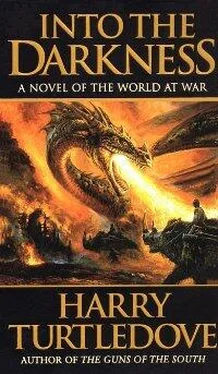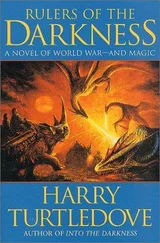He also had work. If the captives wanted wood for cooking and wood for heating—not so great a need in Forthweg as farther south in Derlavai, but not to be ignored as winter drew nearer, either—they had to cut it and haul it back. Work gangs under Algarvian guard went out every day. If they wanted latrines to keep the camp from being swamped by filth and disease, they had to dig them. The place stank anyway, putting Leofsig in mind of a barnyard once more.
If they wanted food, they had to depend on the Algarvians. Their captives doled out flour as if it were silver, salt pork as if it were gold. Like most Forthwegians, Leofsig was on the blocky side. The block that was he had been narrowing ever since he’d surrendered.
“They don’t care,” he said to his neighbor after yet another meager meal. “They don’t care in the least.”
“Why should they?” the fellow with the cot next to his replied. He was a blond Kaunian named Gutauskas, and already lean. “If we starve to death, they don’t have to worry about feeding us any more.”
That was so breathtakingly cynical, Leofsig could only stare. The fellow with the cot on the other side of his, though, a burly chap called Merwit, spat in disgust. “Why don’t you shut up and die now, yellow-hair?” he said. “Weren’t for you cursed Kaunians, we wouldn’t have gotten sucked into this war in the first place.”
Gutauskas raised a pale eyebrow. “Oh, indeed: no doubt,” he said, speaking Forthwegian without perceptible accent but with the elegant precision more characteristic of his own language. “Both his name and his looks prove King Penda to be of pure Kaunian blood.”
Leofsig snickered. Penda was stocky and swarthy like most Forthwegians, and bore a perfectly ordinary Forthwegian name. Merwit glared; he was the sort who fought with a verbal meat-axe, and wasn’t used to getting pierced with a rapier of sarcasm. “He’s got a bunch of Kaunian lickspittles around him,” he said at last. “They clouded his mind, that’s what they did, till he didn’t know up from yesterday. Why should he care a fart what happens to Valmiera and Jelgava? Algarve can blaze ’em down, for all I care. I’ll watch ’em burn and wave bye-bye.”
“Aye, King Penda’s lickspittles have done wonders for the Kaunians in Forthweg,” Gutauskas said, sardonic still. “They’ve made us all rich. They’ve made all our neighbors love us. If there were ten of us for one of you, Merwit, you’d understand better.” He paused. “No. You wouldn’t. Some people never understand anything.”
“I understand this.” Merwit made a large, hard fist. “I understand I can beat the stuffing out of you.” He started toward Gutauskas.
“No, curse it!” Leofsig grabbed him. “The redheads’ll come down on all of us if we brawl.”
Merwit surged in his grasp. “They won’t care if we stomp these sneering blond scuts. They can’t stand ’em, either.”
“In the case of Mezentio’s men, it is, I assure you, quite mutual,” Gutauskas said.
When Leofsig didn’t let go, Merwit slowly eased. “You just better watch your smart mouth, Kaunian,” he told Gutauskas, “or one fine day all of you stinking bastards in this camp’ll have your pretty yellow heads broken. You better pass the word, too, if you know what’s good for you.” He twisted free of Leofsig and stomped off.
Gutauskas watched him go, then turned back to Leofsig. “You may find your head broken for having taken our part.” He studied him like a natural philosopher examining some new species of insect. “Why did you? Forthwegians seldom do.” The Kaunian’s mouth twisted. “Folk not of our blood seldom do.”
Leofsig started to answer, then stopped with his mouth hanging foolishly open. He had no special love for Kaunians. His admiration for Kaunians was principally limited to their women in clinging trousers. He needed to think for a bit before he could figure out why he hadn’t joined Merwit against Gutauskas. At last, he said, “The Algarvians have all of us in the palm of their hand. If we start squabbling in here, they’ll laugh themselves sick.”
“That is sensible,” Gutauskas said after his own pause for thought. “You would be astonished at how seldom people are sensible.”
“My father says the same thing,” Leofsig answered.
“Does he?” Gutauskas’s eyebrow rose again. “And what, pray, does your father do, that he has acquired such wisdom?”
Is he laughing at me? Leofsig wondered. He decided Gutauskas wasn’t; it was merely the Kaunian’s manner. “He keeps books in Gromheort.”
“Ah.” Gutauskas nodded. “Aye. I can see reckoning up that on which men spend their silver and gold would give a man vivid insight into the manifold follies of his fellow men.”
“I suppose so,” said Leofsig, who hadn’t thought about it much.
He waited for Gutauskas to thank him for stopping the fight. The Kaunian did nothing of the sort. He acted as if Leofsig could hardly have acted differently. Kaunians never made it easy for their neighbors to get alone with them. Had they made it easy for their neighbors to get along with them, they wouldn’t have been the Kaunians he knew. He wondered what they would have been.
Before he could take that thought any further, a squad of Algarvian guards tramped into the barracks. In bad Forthwegian, one of them said. “We search. Maybe you try escape, eh? You go out.” The others supplemented the order with peremptory gestures with their sticks.
Out Leofsig went, Gutauskas trailing after him. Crashes and thuds inside said the Algarvians were tearing the barracks to pieces. If anyone in there was plotting an escape, Leofsig didn’t know about it. He did know what he’d find when the Algarvians let him and his fellow captives return: chaos. The Algarvians were good at tearing things to pieces. They didn’t bother setting them to rights again. That was the captives’ problem.
He strolled toward the fence around the camp—carefully, because the guards there would blaze without warning Forthwegians who came too close. The fence itself wasn’t particularly strong. Captives could rush it… if most of the ones who tried didn’t mind dying before they got there. A few captives had escaped, the Algarvians discovering it only when their counts came out wrong. Leofsig didn’t know how the escapees had done it. Had he known, he’d have done it himself.
“You there, soldier!” a Forthwegian officer snapped at him. “If you haven’t got anything better to do than waddle around like a drunken duck, draw a shovel and go fill in some slit trenches or dig some new ones. We’ve got no room in this camp for idle hands, and I’ll thank you to remember it.”
“Aye, sir,” Leofsig said resignedly. Even as captives, officers maintained the right to give common soldiers orders. The only difference was, even the brigadier who was the captives’ commandant had to obey the orders of the lowliest Algarvian trooper. Leofsig wondered how the brigadier, who was also a belted earl and a proud and touchy man, enjoyed being on the receiving end of commands. Maybe the experience would teach him something about what a common soldier’s life was like. Somehow, Leofsig doubted it.
The shovels made a sadly mismatched collection. A few were Forthwegian army issue; more, though, looked to have been looted from the farm surrounding the captives’ camp. The officer in charge of the latrines, an intense young captain, had nonetheless arranged them in a neat rack he’d built from scrap lumber.
“Ah, good,” he said as Leofsig made his slow approach. “It’s nasty work, to be sure, but someone’s got to do it. Choose your weapon, soldier.” He pointed toward the rack of shovels.
“Aye, sir,” Leofsig said again, and took as long as he could deciding among them. No one expected a captive to move fast; on what the Algarvians deigned to feed them, the captives couldn’t move fast. Leofsig knew as much, and took advantage of it.
Читать дальше












